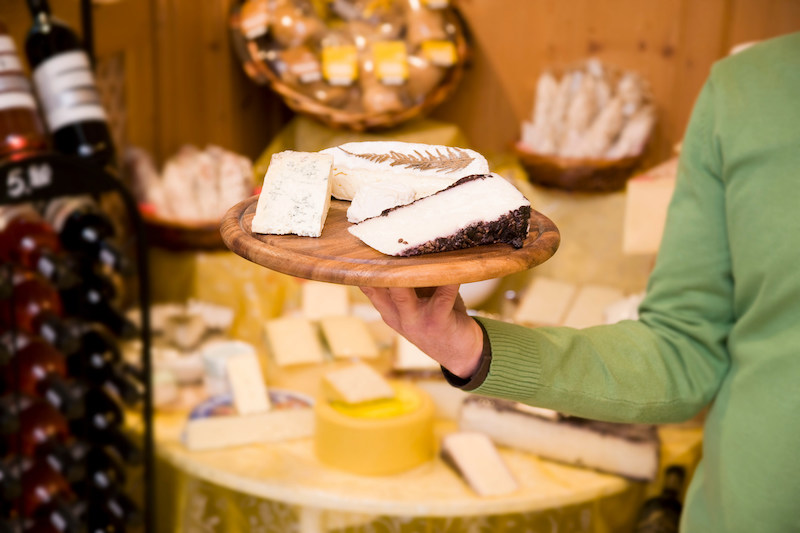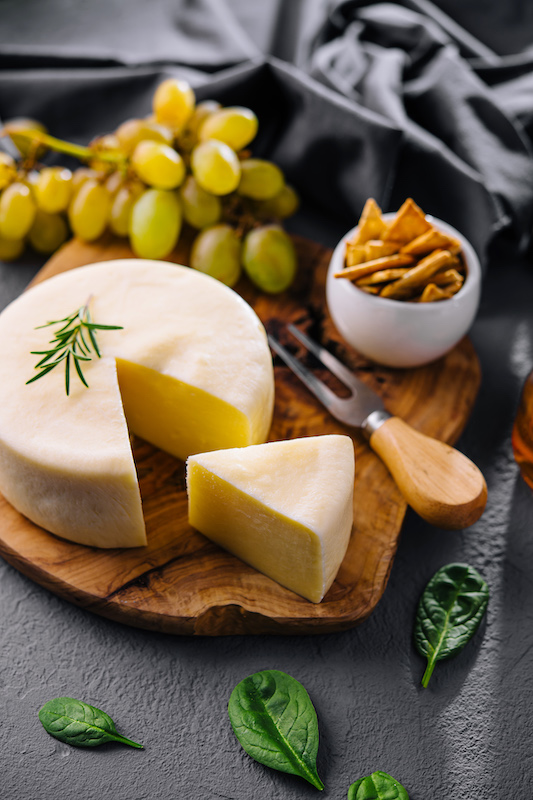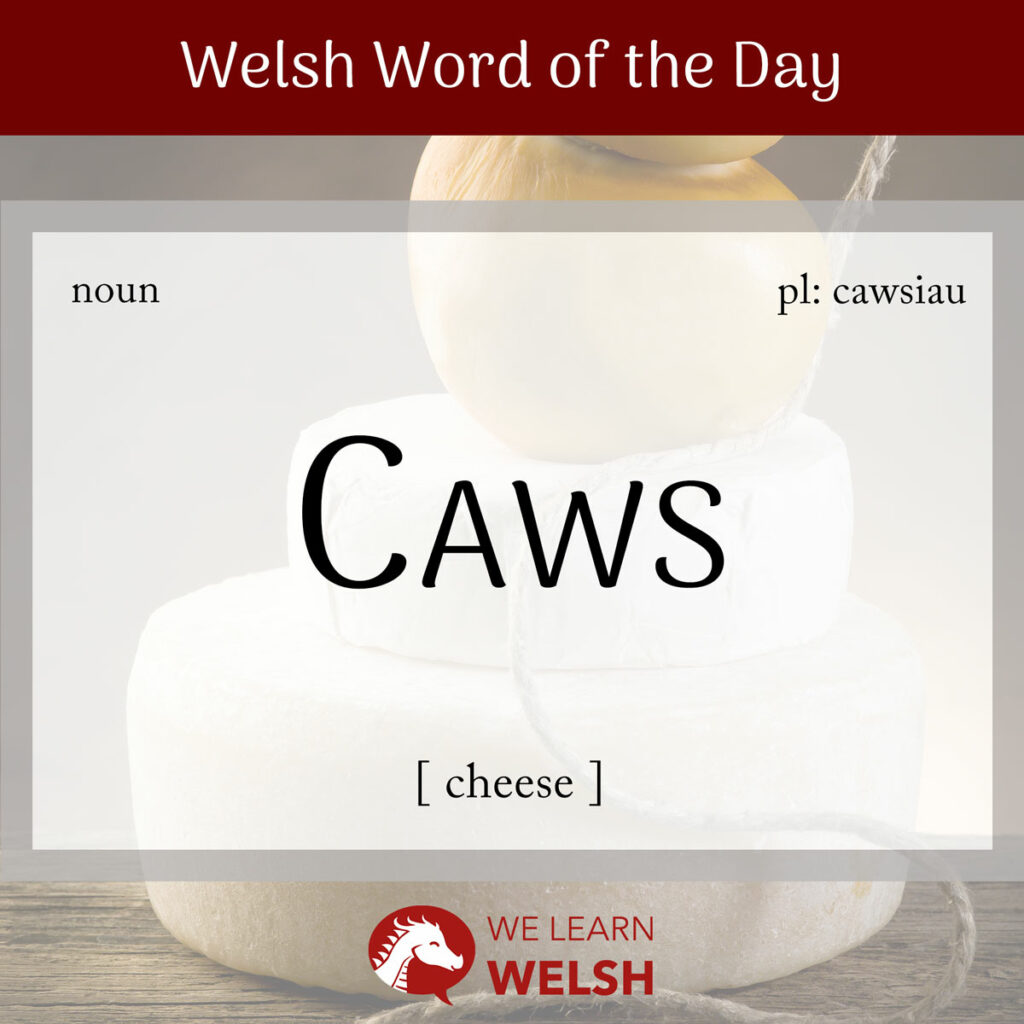In my experience, Cymru (Wales) is no different to the rest of Ewrop (Europe) when it comes to caws (cheese) – we love it!
This word behaves a bit weirdly when it comes to plurals. Many people simply say cawsiau to mean cheeses, but this is a bit of a modern innovation.
caws
cheese
Technically, caws is not a countable noun. If you want to be able to talk about different numbers of cheeses you would instead need to use the word cosyn (a cheese), the plural of which is cosynnau or cosynnod. So two individual rounds of cheese are technically actually dau gosyn.
Cosyn isn’t used very much these days, with cawsiau becoming more and more common instead of cosynnau, too.
A relevant modern usage of it might be if you were packing an individually wrapped cheese, like a Babybel, in a bocs bwyd (lunch box) – you could ask your child wyt ti eisiau cosyn? (do you want a cheese?) Still, most people would just say wyt ti eisiau caws? (do you want cheese?)
It’s no accident that this word is fairly similar to the English translation. Caws existed as *kos in proto-Brittonic, but was actually borrowed in from the Latin caseus, which is the root of the English word too.
It’s a masculine noun, which is subject to all three kinds of mutation:
Soft mutation
gaws
Nasal mutation
nghaws
Aspirate mutation
chaws
A common example of when mutations are very often used is after personal pronouns. So for example, your cheese is dy gaws, my cheese is fy nghaws, and her cheese is ei chaws.
The aspirate mutation also occurs after a (and), which means it shows up in the Welsh translations of a lot of popular dishes involving caws, like blodfresych a chaws (cauliflower cheese), macaroni a chaws (macaroni cheese), and bara a chaws (bread and cheese). The humble bara a chaws is used in a similar way to bread and butter in English, to describe sustenance generally, or as an example of the simplest possible meal.

There are quite a lot of different ways to say cheesy, but the word isn’t used as often as it would be in English because it doesn’t have the same connotation of corny or sentimental. Still, if you do want to talk about a cheesy blas (flavour), you could go for any of cawslyd, cawsaidd, fel caws, cawsog or cawsiog.
Dw i’n hoff iawn o fwyta caws.
I really like eating cheese.
A lot of different kinds of caws are named after places, which means they’re described the same way in Welsh as they would be in English – think caws Cheddar (cheddar cheese) or caws Caerffili (Caerphilly cheese).
The same is true for kinds of caws that comes from words in different languages, like caws ffeta (feta cheese), caws Parma (Parmesan cheese) and caws mosarela (mozzarella cheese). But there are some that translate the English word, or even go by a completely different name:
- caws hufen = cream cheese
- caws sur = buttermilk cheese (literally sour cheese)
- caws colfran = cottage cheese
- caws cnap = dry cheese
- caws llwyd = blue cheese (literally grey cheese)
- caws coch = red cheese
- caws gafr = goat’s cheese
- caws dafad = sheep’s cheese
For most consumers in the UK, though, the majority of the caws we eat comes from the llaeth (milk) of buchod (cows). Although many people have concerns about ethical issues related to animal farming and may choose to eat a feganaidd (vegan) diet, caws still remains one of the most popular ingredients in British diets.
It’s not the only popular cynnyrch llaeth (dairy product), though, as llaeth (or llefrith in the North!) can be made into iogwrt (yoghurt), menyn (butter), hufen (cream), hufen ia (ice cream), and ceulfwyd / cwstard (custard).
A lot of Welsh foodstuffs rely on cynhyrchion llaeth, and caws perhaps more than any other. For example, the famous selsig Morgannwg (Glamorgan sausage) is actually a vegetarian sausage, made of caws, cennin (leeks) and briwsion bara (breadcrumbs) rather than meat.
Of course, one of the most famous dishes in Wales is caws pobi (baked cheese), generally known outside of Wales as Welsh rarebit. This nonsense word – rarebit – is a corruption of rabbit (actually cwningen in Welsh). The term Welsh rarebit for cheese on toast was probably adopted by the English as a way to make fun of Welsh people not being able to afford meat.
Dych chi eisiau brechdan gaws neu frechdan jam?
Do you want a cheese sandwich or a jam sandwich?
The importance of caws to the Welsh shows up in some idioms and proverbs too. Y drwg yn y caws (the bad thing in the cheese) means the root cause of a problem, while ennill ar y menyn a cholli ar y caws (winning on the butter and losing on the cheese) is used in a similar way to swings and roundabouts in English. To do something impossible is cael caws o fola ci (getting cheese from a dog’s belly).
And I hadn’t heard this before, but I found out while reading up for this article that in Anglesey, fresh cheese is known as caws gwirion (silly cheese). I’d love to find out where this comes from – if you have any ideas, let us know!


